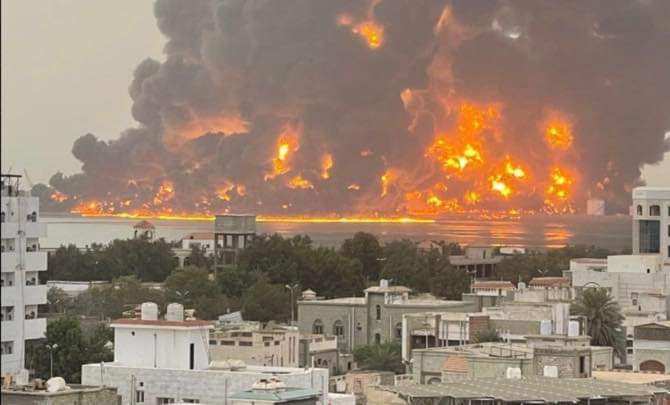By Adeyemi Adekunle
The Israeli military launched its first-ever large-scale air raid on the Yemeni port city of Hodeidah, igniting a massive inferno at the port’s oil terminal on Saturday. The operation not only marks a significant intensification but also changes the narrative in the ongoing conflict between Israel and the Yemen-based Houthi militant group.
While Speaking The Israel Defense Forces (IDF) confirmed the strike through a statement, that is the retaliation for numerous attacks on Israeli-linked civilian vessels and missile strikes by the Houthis. “A short while ago, IDF fighter jets struck military targets of the Houthi terrorist regime in the area of the Hodeidah port in Yemen in response to the hundreds of attacks carried out against the State of Israel in recent months,” the statement read.
Eyewitnesses and online footage revealed the devastating impact of the strikes, which targeted the port’s oil terminal. Multiple storage tanks erupted into flames, sending thick plumes of black smoke skyward.
The fire spread rapidly, fueled by leaking oil, and created a towering wall of fire that could be seen from miles away. Local media reports suggest that the attack likely resulted in casualties, although the exact number remains unclear amid the chaos.
Israeli Prime Minister Benjamin Netanyahu addressed the nation following the attack, asserting that the Hodeidah port was being used by the Houthis to receive arms shipments from Iran. “This operation is a necessary response to protect Israeli citizens and ensure the safety of our maritime routes,” Netanyahu stated.
The Prime minister also referenced a recent drone attack on Tel Aviv, attributed to the Houthis, which killed one person and injured at least ten near the US Embassy’s branch office.
The Houthi militant group, a Shia Islamist faction controlling much of Yemen, claimed responsibility for the Tel Aviv drone attack, boasting about their advanced drone technology.
They described the operation as a significant military achievement, demonstrating their ability to evade enemy defenses.
Since October, the Houthis have intensified their campaign against Israeli-linked merchant vessels, framing their actions as a show of solidarity with Palestinians in Gaza.
The group’s spokesperson reiterated their commitment to the campaign, declaring that their attacks will continue until Israel ceases its “aggression.”
In response to the Houthi actions, a coalition led by the United States and the United Kingdom has conducted airstrikes against the group.
However, these efforts have so far failed to halt the Houthi attacks on merchant vessels and coalition warships, highlighting the group’s resilience and tactical capabilities.
The situation in Hodeidah remains tense as emergency services struggle to contain the fire and assess the full extent of the damage. The port, a vital lifeline for Yemen, is now crippled, raising concerns about the humanitarian impact on a nation already devastated by years of conflict.
This unprecedented Israeli airstrike signals a new phase in the conflict, with potential ramifications for regional stability. As the flames continue to burn in Hodeidah, the international community watches closely, bracing for the possible escalation of violence in an already volatile region.



